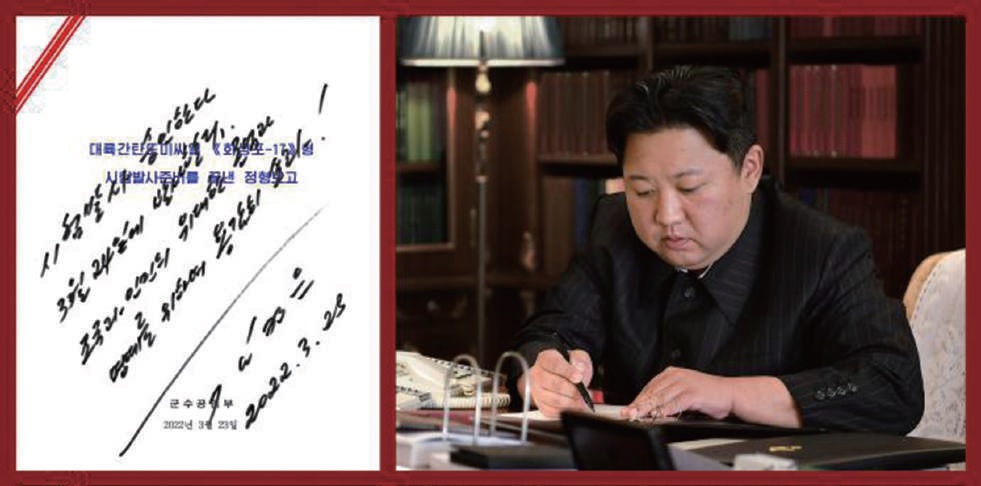和平與穩定的保證
和平與穩定的保證
A Guarantee of Peace and Stability

In October last year the Defence Development Exhibition, Self-Defence 2021, was held in Pyongyang, the capital of the Democratic People’s Republic of Korea. It clearly showed that the DPRK heads the list of world-class military powers.
The forces hostile towards the country are very vocal in their claim that the DPRK’s defence buildup poses a threat to the neighbouring countries and harm to world peace and security.
However, their claim is far too unconvincing.

A Right to Independence of a Sovereign State
The DPRK is a sovereign state like 200-plus countries in the world. Just as they have a right to strengthen their defence capabilities, so does the DPRK.
But, taking underhand advantage of the UN Security Council, the hostile forces invented a “resolution” disallowing the country to develop its missile technology. It is an unlawful and illegal action infringing upon the right to independence of a sovereign state but they remain silent about it.
According to their logic, the missile tests conducted by the US and other countries do not matter, whereas that of the DPRK “threatens” the world, which is an epitome of double standards.
While constantly browbeating the country with tens of thousands of nuclear weapons and other pieces of state-of-the-art military hardware, they are following such a ridiculous logic that it has no right to possess defence capabilities to deter them.
Their ulterior motive for doing so is based on the fact that the DPRK pursues a different ideal from theirs and poses an obstacle in realizing their strategy of global supremacy. As long as it maintains socialism and anti-imperialist independence, it will eternally remain a “threat,” even if it has only conventional weapons, far from cutting-edge military hardware. Trumpeting about its “threat” is nothing but a scream of upset proving that they are failing to stifle it.

No Harm to the Security of Neighbouring Countries
The DPRK’s defence capability does no harm to the security of its neighbouring countries. It stands to no reason that it threatens the security of China and Russia, with which it shares a history and traditions of deep-rooted friendship.
The same is the case with its attack against south Korea, a part of the land on which the homogeneous nation has been living. The attack equates precisely to total devastation of the Korean peninsula as a whole and extinction of the nation, an unimaginable outcome for the DPRK that has been striving for decades to defend the land for the current and future generations from the holocaust of a nuclear war.
Also, it is unreasonable to think that it threatens the rest of the world including the countries on the coast of the Pacific Ocean, for it is involved in no historical conflict or dispute with them.
The US and Japan, that are most preoccupied with the DPRK strengthening its defence capability, do not need to worry about it, either.
Kim Jong Un, President of the State Affairs of the DPRK, confirmed in the opening ceremony of the Defence Development Exhibition that the country’s true enemy is war itself, not the US or any other specific state or forces.


Strong Defence Power of the DPRK, a Demand of the History and the Present Reality
Historically, Korea has been subject to aggression by external forces as it is situated in the geopolitically important region that links oceanic states and continental ones.
From the mid-19th century, the Korean peninsula was reduced to a theatre of competition for ascendancy of the big powers seeking to stretch their influence into the continent and ocean. Sino-Japanese (1894-1895) and Russo-Japanese (1904-1905) wars broke out here, eventually putting the peninsula under the military occupation of Japanese imperialism backed by the western European powers.
The victory of the oceanic forces in the scramble for the peninsula led to the Sino-Japanese War (1937-1945) and the Pacific War (1941-1945), subjecting humanity to immense pain and damage.
But what would have happened if the then Korea had been powerful? Both the continental and oceanic forces who had sought more influence into each other would not have dared to invade it. And so there would have been no collision between them, neither could have absolute dominance over the continent or the ocean, and the regional peace and security would have been maintained.
Today the national strength of China and Russia is being strengthened rapidly, regenerating the friction between the oceanic forces including the US and Japan and the continental ones.
In particular, the region of northeast Asia, with its extensive market and rich personnel and material resources, is attracting the attention of the world as a potential engine for the global economic growth. The question of taking the lead in this region is something vital to the development prospect of global powers.
In this regard, the Korean peninsula still remains a key area as it links the continent and the ocean. This is why experts think that a new cold war between the two forces is inevitable and the peninsula will surely be the arena of primary conflict between them.
In light of this, what will happen to the DPRK, if it remains weak as it was in the late 19th century and the early 20th century? Nobody would guarantee that history would not repeat itself.
The strong defence capabilities of the DPRK are a serious requirement of the history, the present reality and the global peace and stability.

Source: Consulate General of the Democratic People’s Republic of Korea in Hong Kong
- Log in to post comments





